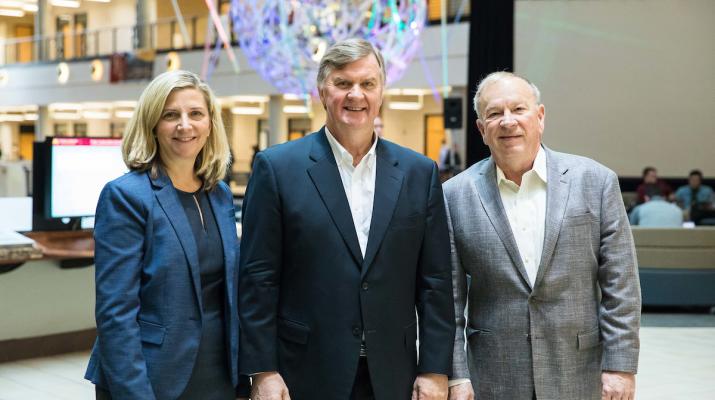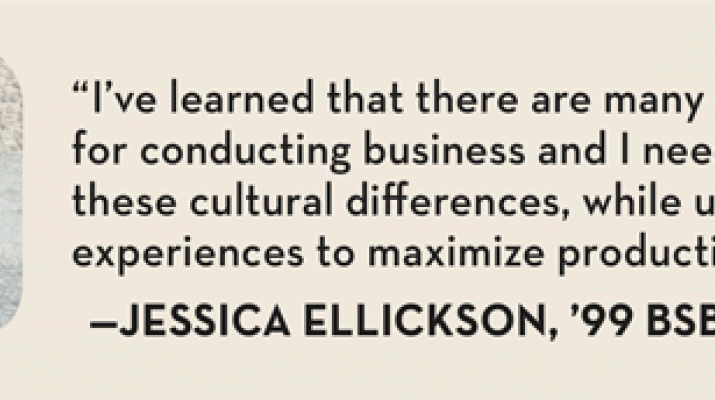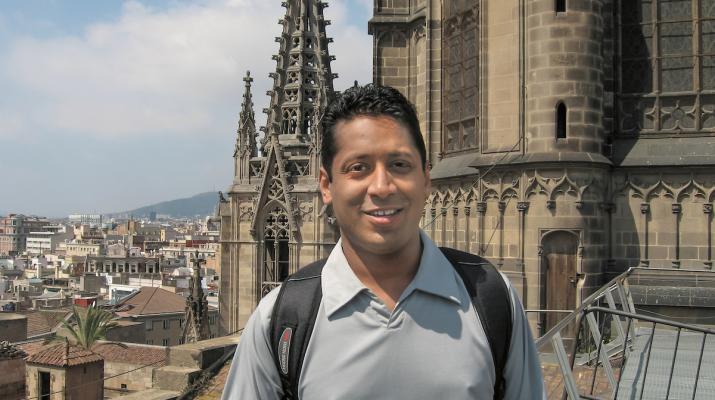
New Research Confirms Value of Learning Abroad
Sunday, September 1, 2013
By Bridget Aymar
The Carlson School requires all students to study abroad as part of their business education. This requirement is rooted in the belief that immersing oneself in a new cultural environment enriches future professionals in innumerable ways. The Carlson Global Institute (CGI) has new empirical evidence that proves the positive implications that international experiences have for students’ personal and professional growth.

"It's having a framework to guide your understanding of different cultures."
This year CGI released a study that verifies the link between international experiences and increased global competence. The research examined how studying abroad affects global competence and the intensity of global mindsets in undergraduate and graduate students.
The study scored undergraduate students’ overall global competence using the Intercultural Development Inventory, a statistically reliable measure of intercultural sensitivity and awareness.
The results showed that students who participated in any of CGI’s international programs demonstrated a higher motivation to become more globally competent. Participants in semester-long programs showed the highest level of intercultural development.
“To be globally minded is to be skilled at dealing with uncertainty, to be comfortable interacting with people from unfamiliar cultures, and to be more willing to accept cultural norms other than your own,” says Associate Dean of Global Initiatives Michael Houston. “It’s having a framework to guide your understanding of different cultures.”
CGI saw similar outcomes for graduate students. CGI evaluated Part-Time MBA students using the Global Mindset Inventory, an assessment tool designed to measure a participant’s ability to better influence individuals, groups, and organizations different from themselves. The results showed students who underwent an international experience demonstrated significantly higher global mindset scores. The data suggests that studying abroad is instrumental in helping students understand and interact with people from diverse cultures.
“Understanding global business practices and learning to communicate more effectively cross-culturally are very important skills in our global economy,” says Assistant Dean of Global Initiatives Anne D’Angelo. “Alumni often describe how their education abroad experiences change the trajectory of their career paths.”

"When you start to understand the commonalities in people, you start to understand how to effectively manage them."
International Communications
Studying abroad qualified Paul Fondie, ’00 MBA, for new career opportunities and led him to earn an MBA from the Carlson School. Fondie was one of three undergraduate students accepted into Supply Chain and Operations Professor John Anderson’s two-week business course hosted in Vienna. Studying transitional economies in Eastern Europe whetted Fondie’s appetite for international learning, and as a young professional he embarked on a summer program to Lyon, France. Excursions to the United Kingdom, Romania, and Bulgaria soon followed. And when an opportunity arose at AIG for a communicator versed in European business practices, Fondie won the job. Today, his role with AIG incorporates business in Europe, the Middle East, and Africa.
The international business pro believes that globally minded individuals find commonalities in people across borders, cultures, and customs. When once he examined the differences between business practices abroad and at home, now he seeks out the similarities.
“When you start to understand the commonalities in people, you start to understand how to effectively manage them,” he says. “When you no longer focus on the differences, you start to see what is common in people and how to influence them.”

"I've learned that there are many different styles for conducting business and I need to adapt to these cultural differences, while using my previous experiences to maximize productivity."
Cultural Fluency
Jessica Ellickson, ’99 BSB, ’06 MBA, first traveled abroad when studying in Vienna alongside students from 50 different countries. During her international program, Eastern Europe was undergoing a period of transition from a command system to a market system. While living in Vienna, she saw firsthand how the culture was evolving and gained a new perspective on life and business.
During a subsequent MBA program in Vienna and Moscow, Ellickson participated in a live case study with 3M. She learned how business is conducted differently and how the role of the government varies significantly across cultures.
“When I studied abroad, I was welcomed by people from all different cultures, and I realized that there are more similarities than differences between myself and other international students,” she says. “I discovered the more we learn from each other, the more we can break down cultural barriers.”
The MBA alumna believes her international experiences were factors in helping her obtain a global position with The Coca-Cola Company. Today, Ellickson has traveled to more than 20 countries and managed at least 30 global projects as the director of shopper marketing. Currently, she’s living in Mexico City and is responsible for the shopper marketing strategy in Latin America. Now that she is living in Mexico, she is learning how to adapt to the local cultures across Latin America.
“I’ve learned that there are many different styles for conducting business and I need to adapt to these cultural differences, while using my previous experiences to maximize productivity,” she says. “Living abroad has truly changed my life and my perspective on how amazing this world is and can be.”

"Because of my international experiences, I was less nervous about living in another country for a few months."
Environmental Flexibility
Ashok Dhariwal, ’96 MBA, cites his experience studying and working internationally as a key differentiator in his career. As a globally minded professional, he demonstrates a willingness to take chances and is comfortable facing new challenges.
Dhariwal studied international marketing and strategy in Barcelona as a graduate student and later joined an international program in Vienna. Immediately after graduation, he was offered a position with Arthur Anderson’s retail consulting division to consult on a project in Saudi Arabia. He noted his experience studying abroad weighed heavily on the hiring decision for the engagement.
“They asked me if I had a passport. I said yes, and two weeks later they made me an offer,” he says. “There were a lot of qualified people in the pool, but none wanted to travel. Because of my international experiences, I was less nervous about living in another country for a few months.”
Today, Dhariwal is group manager of the retail clinics division at Target. He points out that most U.S.-based companies have constituents or stakeholders in the global business environment.
Globally minded, open to new opportunities, and keen to cultural differences across international boundaries, these alumni personify the benefits of global learning.